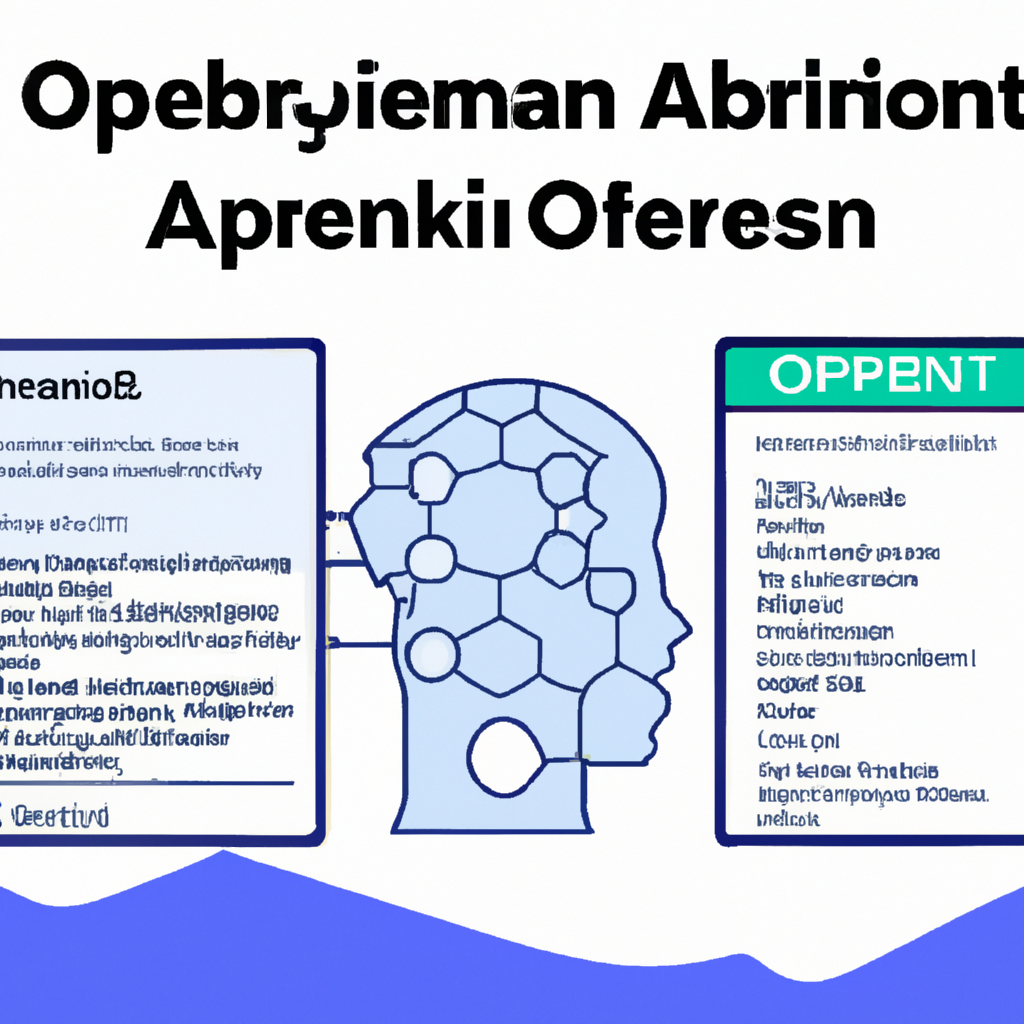-
Table of Contents
- Introduction
- How OpenAI is Changing the Job Market: Exploring the Benefits and Risks
- The Impact of OpenAI on the Future of Work: What Employers Need to Know
- The Growing Role of OpenAI in Automation and Job Creation
- How OpenAI is Transforming the Skills Needed for the Future Workforce
- Exploring the Impact of OpenAI on Job Security and Job Satisfaction
- Conclusion
“Unlock the Potential of OpenAI: Embrace the Challenges and Unlock New Job Opportunities!”
Introduction
OpenAI is a non-profit artificial intelligence research company that has been making waves in the tech industry since its inception in 2015. OpenAI has been at the forefront of developing cutting-edge AI technologies, and its impact on the job market has been significant. OpenAI has created new opportunities for workers, while also presenting challenges for those who are not prepared to adapt to the changing landscape. In this article, we will explore the impact of OpenAI on the job market, including the opportunities and challenges it presents. We will also discuss how employers and job seekers can best prepare for the future of work in an AI-driven world.
How OpenAI is Changing the Job Market: Exploring the Benefits and Risks
The emergence of OpenAI, a non-profit artificial intelligence research company, is revolutionizing the job market. OpenAI is dedicated to developing artificial general intelligence (AGI) that can be used to benefit humanity. This technology has the potential to create new jobs, increase productivity, and reduce costs. However, it also poses some risks, such as the displacement of human workers and the potential for misuse. In this article, we will explore the benefits and risks of OpenAI and how it is changing the job market.
The most obvious benefit of OpenAI is the potential to create new jobs. As AGI technology advances, it will open up new opportunities for people to work in fields such as robotics, machine learning, and data science. This could lead to an increase in the number of jobs available and a decrease in unemployment. Additionally, OpenAI could help to increase productivity by automating mundane tasks and freeing up workers to focus on more complex tasks. This could lead to increased efficiency and cost savings for businesses.
However, OpenAI also poses some risks. One of the most significant is the potential for job displacement. As AGI technology advances, it could replace human workers in certain roles, leading to job losses. Additionally, there is the potential for misuse of the technology. OpenAI could be used to create autonomous weapons or to manipulate public opinion, which could have serious consequences.
Overall, OpenAI is changing the job market in both positive and negative ways. It has the potential to create new jobs, increase productivity, and reduce costs. However, it also poses some risks, such as job displacement and misuse. It is important to consider both the benefits and risks of OpenAI before embracing it as a solution to the job market.
The Impact of OpenAI on the Future of Work: What Employers Need to Know
The future of work is changing rapidly, and OpenAI is at the forefront of this transformation. OpenAI is a research laboratory dedicated to developing artificial intelligence (AI) technologies that can be used to automate and improve many aspects of work. As OpenAI continues to develop and refine its AI technologies, employers need to be aware of the potential impact these technologies could have on their businesses.
OpenAI’s AI technologies are already being used in a variety of industries, from healthcare to finance. In healthcare, AI is being used to automate administrative tasks, such as scheduling appointments and managing patient records. In finance, AI is being used to automate financial analysis and trading. As OpenAI continues to develop and refine its AI technologies, employers need to be aware of the potential impact these technologies could have on their businesses.
OpenAI’s AI technologies could have a significant impact on the future of work. For example, AI could be used to automate many of the mundane tasks that are currently done by humans, freeing up employees to focus on more complex tasks. AI could also be used to improve decision-making processes, allowing employers to make more informed decisions faster. Additionally, AI could be used to improve customer service, allowing employers to provide better service to their customers.
However, OpenAI’s AI technologies could also have a negative impact on the future of work. For example, AI could be used to replace human workers, leading to job losses. Additionally, AI could be used to automate decision-making processes, leading to decisions that are not in the best interests of employees or customers.
As OpenAI continues to develop and refine its AI technologies, employers need to be aware of the potential impact these technologies could have on their businesses. Employers should consider the potential benefits and risks of using OpenAI’s AI technologies and develop strategies to ensure that their businesses are prepared for the future of work. Additionally, employers should consider the ethical implications of using AI technologies and ensure that their use of AI is in line with their ethical standards.
By understanding the potential impact of OpenAI’s AI technologies on the future of work, employers can ensure that their businesses are prepared for the future and that their use of AI is ethical and responsible.
The Growing Role of OpenAI in Automation and Job Creation
The rise of automation and artificial intelligence (AI) has been a hot topic in recent years, and OpenAI is at the forefront of this revolution. OpenAI is a non-profit research organization dedicated to advancing artificial intelligence for the benefit of humanity. Founded in 2015 by tech luminaries such as Elon Musk and Sam Altman, OpenAI has quickly become a leader in the field of AI research and development.
OpenAI is focused on developing AI technologies that can be used to automate mundane tasks and create new jobs. For example, OpenAI has developed a robotic arm that can be used to automate the assembly of products in factories. This technology has the potential to reduce the need for manual labor and create new jobs in the process.
OpenAI is also working on AI-driven automation solutions for the healthcare industry. For instance, OpenAI has developed an AI-driven system that can detect cancerous cells in medical images. This technology has the potential to reduce the need for manual labor in the healthcare industry and create new jobs in the process.
OpenAI is also working on AI-driven automation solutions for the financial industry. For instance, OpenAI has developed an AI-driven system that can detect fraudulent transactions in financial records. This technology has the potential to reduce the need for manual labor in the financial industry and create new jobs in the process.
OpenAI is also working on AI-driven automation solutions for the transportation industry. For instance, OpenAI has developed an AI-driven system that can detect traffic patterns and optimize routes for autonomous vehicles. This technology has the potential to reduce the need for manual labor in the transportation industry and create new jobs in the process.
OpenAI is playing an increasingly important role in automation and job creation. By developing AI-driven automation solutions, OpenAI is helping to reduce the need for manual labor and create new jobs in the process. As OpenAI continues to develop new AI technologies, it will be interesting to see how these technologies will shape the future of automation and job creation.
How OpenAI is Transforming the Skills Needed for the Future Workforce
The future of work is changing rapidly, and OpenAI is at the forefront of this transformation. OpenAI is a research laboratory dedicated to developing artificial intelligence (AI) technologies that can benefit humanity. By leveraging the power of AI, OpenAI is helping to create a future workforce that is more skilled, more productive, and more efficient.
OpenAI is focused on developing AI technologies that can help automate mundane tasks, freeing up workers to focus on more complex and creative tasks. This means that the skills needed for the future workforce will be different than those needed today. OpenAI is helping to create a future workforce that is more knowledgeable, more creative, and more capable of solving complex problems.
OpenAI is also helping to create a future workforce that is more diverse. By leveraging AI technologies, OpenAI is helping to create a future workforce that is more inclusive and better able to meet the needs of a diverse population. This means that the skills needed for the future workforce will be more varied and more specialized.
OpenAI is also helping to create a future workforce that is more adaptable. By leveraging AI technologies, OpenAI is helping to create a future workforce that is better able to respond to changing conditions and new challenges. This means that the skills needed for the future workforce will be more flexible and more agile.
OpenAI is helping to create a future workforce that is better equipped to handle the challenges of the 21st century. By leveraging AI technologies, OpenAI is helping to create a future workforce that is more knowledgeable, more creative, more diverse, and more adaptable. This means that the skills needed for the future workforce will be more advanced and more specialized.
OpenAI is transforming the skills needed for the future workforce. By leveraging AI technologies, OpenAI is helping to create a future workforce that is more knowledgeable, more creative, more diverse, and more adaptable. This means that the skills needed for the future workforce will be more advanced and more specialized. OpenAI is helping to create a future workforce that is better equipped to handle the challenges of the 21st century.
Exploring the Impact of OpenAI on Job Security and Job Satisfaction
The emergence of OpenAI has been a game-changer for the world of technology. OpenAI is a non-profit artificial intelligence research company that has been making waves in the industry since its inception in 2015. OpenAI’s mission is to “advance digital intelligence in the way that is most likely to benefit humanity as a whole, unconstrained by a need to generate financial return.”
OpenAI’s impact on job security and job satisfaction is an important topic to consider. On the one hand, OpenAI’s technology could potentially replace certain jobs that are currently done by humans. This could lead to job losses and a decrease in job security. On the other hand, OpenAI’s technology could also create new jobs and opportunities for people to use their skills in new and innovative ways.
When it comes to job satisfaction, OpenAI’s technology could potentially make certain jobs easier and more efficient. This could lead to increased job satisfaction as people are able to do their jobs more quickly and with less effort. However, OpenAI’s technology could also lead to a decrease in job satisfaction as people may feel that their jobs are becoming less meaningful or that they are being replaced by machines.
Overall, OpenAI’s impact on job security and job satisfaction is complex and difficult to predict. It is clear that OpenAI’s technology could potentially lead to both positive and negative outcomes for workers. It is important to consider the potential implications of OpenAI’s technology on job security and job satisfaction and to ensure that workers are protected and supported as the technology continues to evolve.
Conclusion
The Impact of OpenAI on the Job Market presents both opportunities and challenges. On the one hand, OpenAI has the potential to revolutionize the job market by creating new jobs and providing more efficient ways of doing existing jobs. On the other hand, OpenAI also presents a challenge to existing job roles, as automation and AI-driven technologies may replace some of the existing roles. It is important for businesses and individuals to be aware of the potential impact of OpenAI on the job market and to be prepared to adapt to the changing landscape. With the right strategies and investments, OpenAI can be a powerful tool for businesses and individuals to create new opportunities and to remain competitive in the job market.






Pingback: OpenAI: The Power of Choice - 5 Threats and Opportunities for Computer Programmers